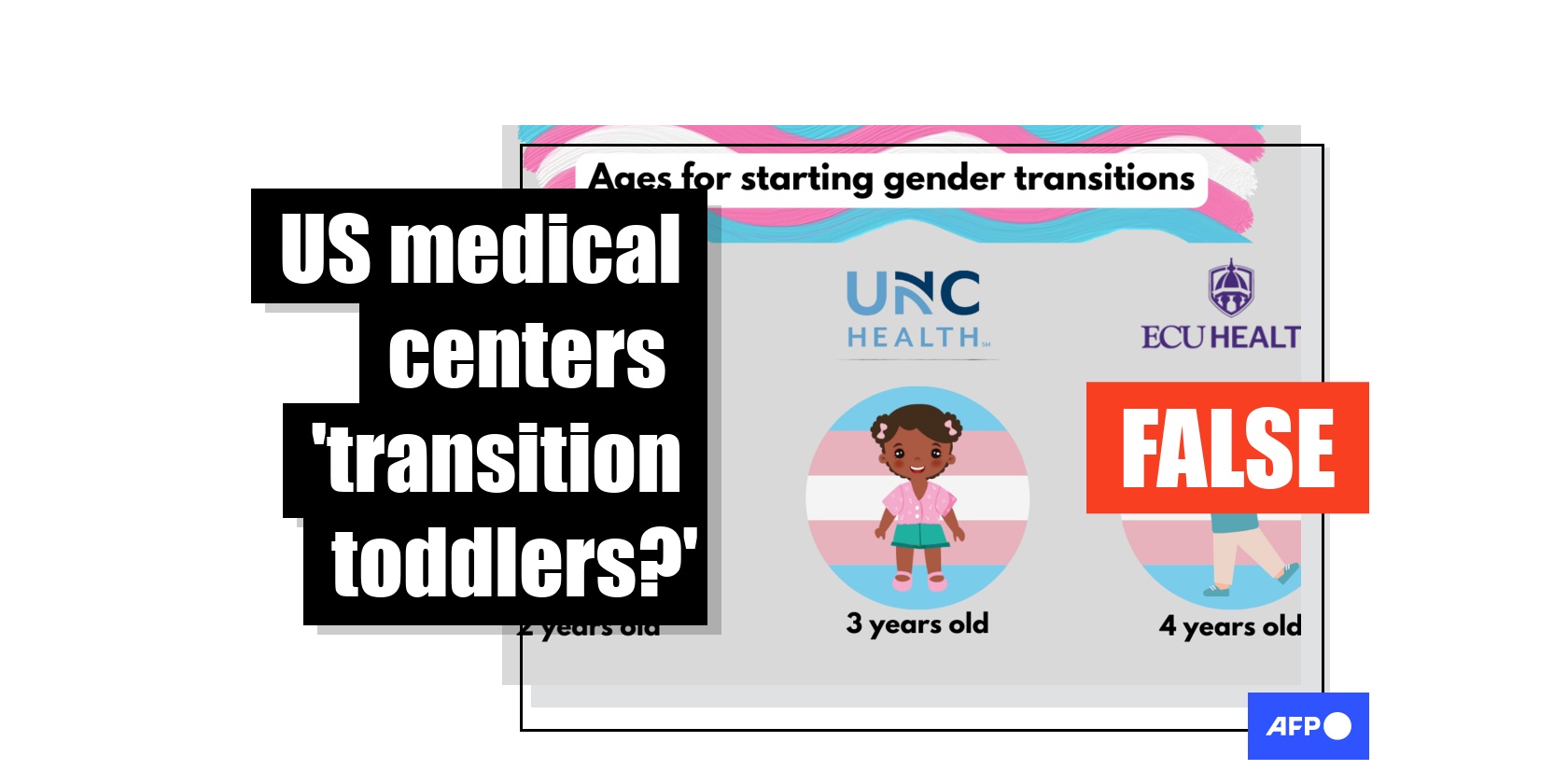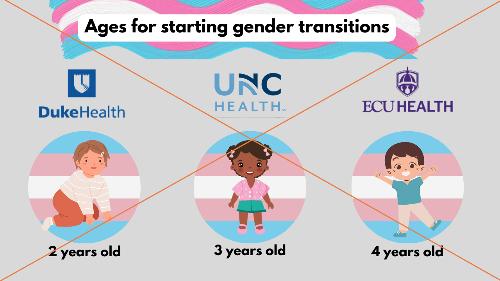
Advocacy group misrepresents gender-affirming care in North Carolina
- This article is more than two years old.
- Published on May 19, 2023 at 17:17
- 4 min read
- By AFP USA
"Transgender toddlers treated at Duke, UNC, and ECU," says the title of a May 1, 2023 article from Education First Alliance, a conservative advocacy group.
The story continues: "Top medical schools in the state are now transitioning toddlers and training future primary care doctors on how to engage in the experimental treatment."
Accompanying the article is a graphic that says the "ages for starting gender transitions" are two, three and four years old at Duke Health, the University of North Carolina (UNC) Health and East Carolina University (ECU) Health, respectively.

Several Facebook posts have shared the story.
"ACCORDING TO TOP MEDICAL SCHOOLS, if a 2 year old baby girl picks up a truck instead of a Barbie, she MUST be a boy and are starting SEXUAL TRANSITIONING!" says a May 5 post.
Education First Alliance's claims gained traction as North Carolina joined several states in advancing restrictions on gender-affirming care for minors. Republican lawmakers have proposed a bill that would ban surgeries and puberty blockers for people under 18.
But the claims shared online are inaccurate -- while each of the university clinics offers counseling for young patients experiencing gender dysphoria, none of them are "transitioning" toddlers.
The claim's origins
The Education First Alliance article cites several different sources out of context to spin a misleading narrative about gender-affirming care in North Carolina.
The story references a now-removed UNC Health webpage (archived here) about the institution's Psychiatry Gender Equity and Wellness Initiative.
"Our mission is to provide coordinated evidence-based care for gender diverse individuals ages 4-30 years and their families exploring or undergoing gender-affirming treatment in the state of North Carolina and the local Southeast region," the page said.
A May 2016 comment from Deanna Adkins, director of Duke Child and Adolescent Gender Care, is also cited in the Education First Alliance article.
Adkins said in an expert declaration (archived here) in the US District Court for the Middle District of North Carolina that, while "most people have a gender identity that aligns with the sex they were assigned at birth," some do not. She said that "lack of alignment can create significant distress for individuals with this experience and can be felt in children as young as two years old."
She added at the time that the Gender Care Clinic was treating children and young adults between the age of seven and 22.
Education First Alliance's piece also mentions a comment from Colby Dendy, a clinical assistant professor of internal medicine and pediatrics at ECU Health, during an April 2022 interview with The East Carolinian.
Dendy told the student newspaper that research indicates children can start forming their gender identity around four years old.
"We do not want to exclude anybody within the pediatrics realm," she said.
The American Academy of Pediatrics (AAP) recommends young people have access to "comprehensive, gender-affirming and developmentally appropriate health care." It says that "current protocols typically reserve surgical interventions for adults," but that in rare cases this may be pursued for adolescents "considering the necessity and benefit to the adolescent’s overall health and often including multidisciplinary input from medical, mental health, and surgical providers as well as from the adolescent and family."
All US states require guardian consent to provide hormonal and surgical care to patients 17 or younger.
'Age-appropriate' care
All three of the health care networks mentioned in the Education First Alliance article said the advocacy group's claims were inaccurate.
ECU Health told AFP in a May 17 email that it "does not offer gender-affirming surgery to minors nor does the health system offer gender-affirming transition care to toddlers."
The clinic also does not provide puberty blockers to children, saying: "Hormone therapy is only offered after puberty and in limited cases under national guidelines that include extensive mental health evaluations and done in consultation with, and with consent from, the parent or guardian."
ECU Health said in a May 4 Facebook post (archived here) that it provides young patients and their families with "mental health care, nutrition and social work."
UNC Health sent AFP a similar statement on May 16, saying the Education First Alliance article "is absolutely false." The medical center added that it is "increasingly concerned about threats to our providers and patients."
The third health care provider cited in the article, Duke Health, said in a May 4 Twitter thread (archived here) that Education First Alliance's accusations are "false."
"Care decisions are made by patients, families and their providers and are both age-appropriate and adherent to national and international guidelines," one post says.
Another post in the thread adds: "Hormone therapies are explicitly not provided to children prior to puberty and gender-affirming surgeries are, except in exceedingly rare circumstances, only performed after age 18."
Like the other medical centers, Duke Health assists young children and their families with medical services such as psychosocial evaluation and screening for depression, eating disorders and other high-risk behaviors.
Counseling for gender dysphoria involves pinpointing why someone feels such incongruence, according to sexologist Eli Coleman. If appropriate, health care providers will help their patients develop tools and skills to cope with the dysphoria.
"Some severely gender incongruent children will display gender diverse expressions which are not aligned with their sex assigned at birth. Parents may become concerned about this behavior at a very young age and seek professional assistance," said Coleman, a professor emeritus at the University of Minnesota.
"With careful evaluation, parental or guardian involvement, and in cooperation with schools and family members, there may be a decision to allow the child to social transition aligned with their gender identity. This may involve dressing in gender diverse fashions including clothing or hairstyles."
AFP has fact-checked other false and misleading claims about LGBTQ issues here.
Copyright © AFP 2017-2026. Any commercial use of this content requires a subscription. Click here to find out more.
Is there content that you would like AFP to fact-check? Get in touch.
Contact us
